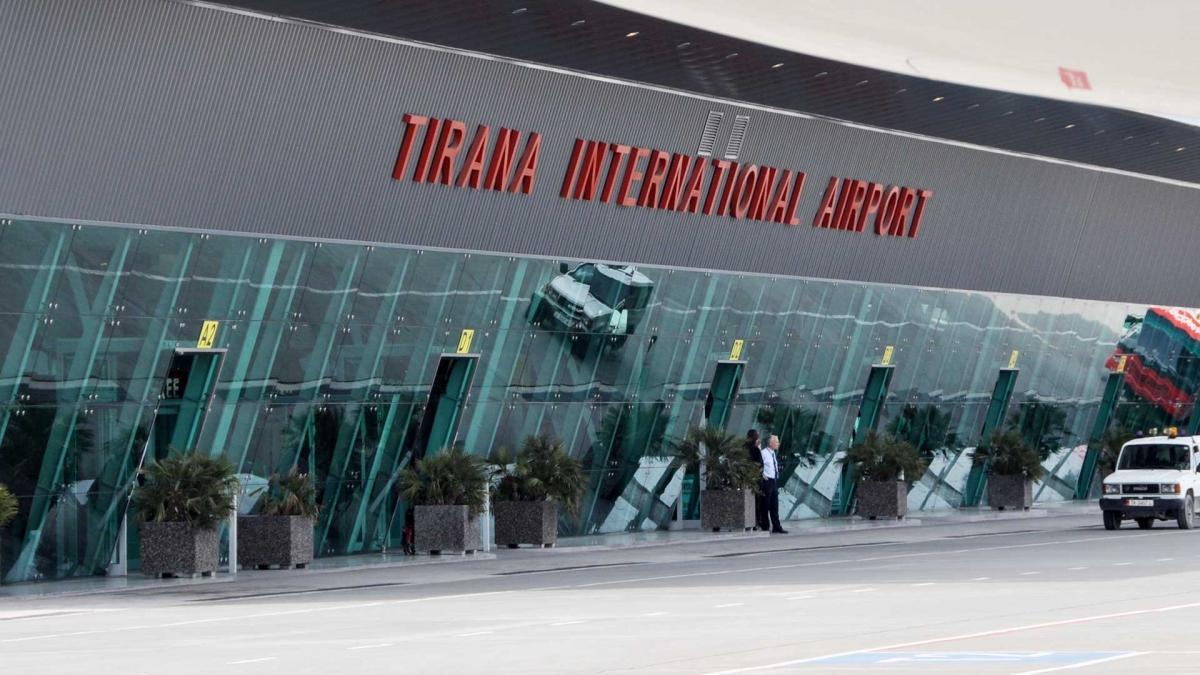

News
Albania’s flights resume after 2-day airport closure
Commercial flights resumed at Albania’s Tirana International Airport on Friday after they were blocked for two days by an air traffic controllers’ strike.
The first commercial flight with passengers left the airport for Italy on Friday at 9:05 a.m. (0705 GMT).
Only “essential” flights took place the previous day. Those included a plane bringing a batch of virus vaccines.
The government has hired Turkish and Greek controllers to replace the local ones. The controllers, who are seeking a pay rise, have avoided calling their action a strike, as that is not allowed under Albanian law, instead declaring a temporary inability to work due to stress.
Prime Minister Edi Rama said two groups of controllers from Turkey and Greece would “work together to continue the operation.” Many Albanian controllers have agreed to resume work, he added.
The government considered the controllers’ walkout illegal.
Three controllers have been detained and are being probed on suspicion of abuse of post. Twenty-seven others were also questioned.
The controllers’ union says their pay has been cut by 62% over the past year due to the impact of the COVID-19 pandemic. Over the same period, Albania’s air traffic has fallen by 57%, according Infrastructure Minister Belinda Balluku.
The minister said air traffic controllers are paid $2,490 a month — five times the country’s average salary of about $500.
The incident has also turned into a political issue as there is a parliamentary election in the country on April 25.
https://apnews.com/article/turkey-albania-coronavirus-pandemic-tirana-air-traffic-control-d10275b1c06ee18d4f9127d110e95325
Albanian organic food store MIA improves safety and sustainability
EBRD and EU help Albanian agribusiness acquire produce safety certificate
Blessed with a warm Mediterranean climate that colours its farmland with lush green hues, Albania has all the features of a leading agricultural realm. Migena Malo runs MIA, an organic grocery store in Tirana’s city centre whose crates of fresh fruits and vegetables put nature’s bounty on display for locals and tourists alike. Although organic, sustainable agriculture is on the rise in Albania, the sector remains largely unconquered. Migena, however, is about to change that.
An advisory project supported by the EBRD and the European Union’s Western Balkans Enterprise Development and Innovation Facility (WB EDIF) helped MIA implement organic food standards and strengthen its brand on the local market.
An authentic taste of Albania
It is a gastronomic truth that the best recipes come from one’s own garden. Migena certainly gives credence to this notion. Her organic store MIA, an acronym for ‘Made In Albania’, is a local gem that sources from local farmers tomatoes, aubergines and blueberries, as well as dairy and poultry products, all free of pesticides.
Migena’s produce is her source of pride, as she has vested all her efforts into building a unique brand, recognised for its adherence to industry standards and best practices.
Like her siblings, Migena spent time studying and living abroad. When she came back to Albania, she joined her family’s business, MIA, quickly assuming a leadership role and putting all her entrepreneurial energy behind driving the fledgling business forward.
“I knew that if we were going to deliver on our long-term goals, we had to open a physical location for our products,” says Migena. She strengthened the company’s online presence and opened a second store, located in the heart of Tirana.
When Migena noticed that MIA had started to incur waste because of the company’s commitment to fresh produce, she launched an in-house kitchen, recycling unsold fruit and vegetables into traditional meals offered during lunch hours.
“People miss homemade food in Albania.... Our kitchen is my way of bringing back the taste of local cuisine. The clients love it. They come to me and say, ‘This tastes just like home,’” she adds.
At the time, the market for organic food was in its infancy, and as demand grew, it became harder for Migena to ensure her suppliers met the requisite standards. She moved the production in-house and invested in her very first greenhouse and hiring more workers - primarily women - to support her new venture.
Harvesting the potential of Albania’s organic farming
To ensure she could continue to follow the appropriate rules and regulations governing organic production, Migena turned to the EBRD for assistance.
An advisory project financed jointly with the WB EDIF helped MIA prepare for and acquire the GLOBALG.A.P. (Global Good Agricultural Practices) certificate, a widely recognised standard in advanced food safety and sustainability. The benchmark will support marketing efforts and help the store attract more clients.
“We feel a real sense of duty and responsibility towards our clients,” says Migena. “As a team, we now understand what it means to produce organically and what sustainability standards we have to fulfil to deliver on that promise.”
Finding meaning in the little things
Migena sees the pandemic as a chance to step back and cherish the simple things in life, and MIA as the perfect setting in which to achieve this.
“One of our clients was prescribed a specific diet for health reasons and they found every item in our little store,” she says. “It is moments like these, when you see how your efforts have truly benefitted others, that you grasp the real meaning of your work and find the passion you need to get through tough days.”
Although Migena is currently focusing on strengthening the brand and solidifying her client base, she is also working on a five-year plan that envisages opening more shops across Albania, supporting the livelihood of local farmers dedicated to sustainability.
ebrd.com/news/2021/albanian-organic-food-store-mia-improves-safety-and-sustainability.html
With EBRD financing, Poland builds first recycling plant for car batteries
With the help of a loan of up to €25 million from the European Bank for Reconstruction and Development (EBRD), Poland will become the site of the first facility in the European Union (EU) for recycling both car batteries and other waste containing metals, in response to the rapid rise of electric vehicles.
The EBRD financing for Elemental Holding S.A. will be part of a wider package raised to finance the construction of the pioneering facility, which will be one of the first in the world to treat spent lithium-ion batteries for electric vehicles and other waste containing metals that are critical for e-mobility.
Elemental Holding S.A. is a Polish company engaged in the collection and recycling of platinum-group metals and electrical waste and has a worldwide presence. The company has operations in Poland, other European countries, the Middle East and the United States of America.
Frederic Lucenet, EBRD Director, Manufacturing and Services, said: “This is an outstanding example of how new technology and progress with the green economy are working hand in hand. The EBRD is actively supporting Poland’s ambitious agenda to become a low-carbon economy and has already financed several large e-mobility projects with domestic and foreign investors.”
Michal Zygmunt, Vice-President of Elemental Holding S.A., added: “The project reflects the strategy of Elemental Holding focusing on the recovery and refining of critical raw materials, with the application of low-carbon-footprint technology and innovations.”
The facility entails the deployment of state-of-the art innovative technology supplemented and co-financed by the Polish National Centre for Research and Development (NCBR) with the support of the European Commission.
The plant will produce secondary metals and other materials that can be reused as raw materials for new batteries or other applications, providing an essential service in the lithium-ion batteries value chain. These batteries are a core component of electric vehicles, sales of which are forecast to overtake those of petrol- and diesel-powered cars as the transition to a low-carbon economy progresses.
The project will reduce greenhouse gas emissions and support the circular economy in the e-mobility sector. The production and use of recycled batteries and metals can lead to carbon savings as high as 98 per cent compared to their primary counterparts, as well as to a more efficient use of scarce natural resources.
The project benefited from technical cooperation support provided by the TaiwanBusiness-EBRD Technical Cooperation Fund and Spain.
To date, the EBRD has invested €10.8 billion in 456 projects in Poland. The Bank is a leading investor in the renewables sector and has previously also co-financed two battery investments for electric vehicles in the country.
https://www.ebrd.com/news/2021/with-ebrd-financing-poland-builds-first-recycling-plant-for-car-batteries-.html










